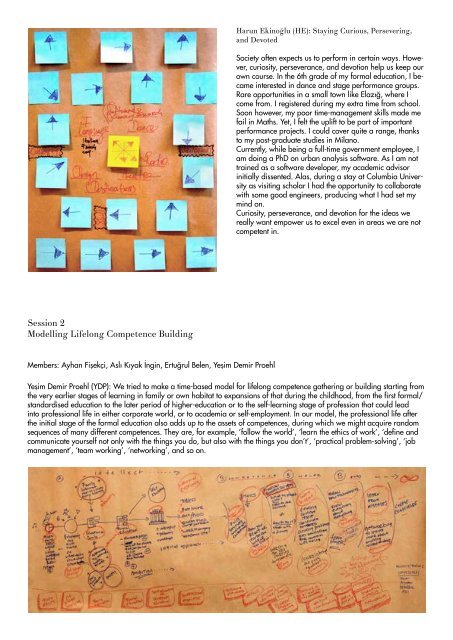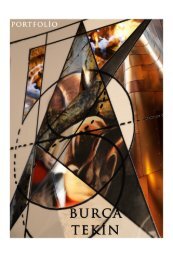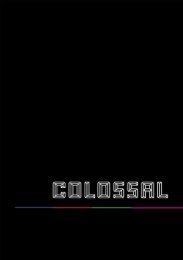hadii
You also want an ePaper? Increase the reach of your titles
YUMPU automatically turns print PDFs into web optimized ePapers that Google loves.
Session 2<br />
Modelling Lifelong Competence Building<br />
Members: Ayhan Fişekçi, Aslı Kıyak İngin, Ertuğrul Belen, Yeşim Demir Proehl<br />
Harun Ekinoğlu (HE): Staying Curious, Persevering,<br />
and Devoted<br />
Society often expects us to perform in certain ways. However,<br />
curiosity, perseverance, and devotion help us keep our<br />
own course. In the 6th grade of my formal education, I became<br />
interested in dance and stage performance groups.<br />
Rare opportunities in a small town like Elazığ, where I<br />
come from. I registered during my extra time from school.<br />
Soon however, my poor time-management skills made me<br />
fail in Maths. Yet, I felt the uplift to be part of important<br />
performance projects. I could cover quite a range, thanks<br />
to my post-graduate studies in Milano.<br />
Currently, while being a full-time government employee, I<br />
am doing a PhD on urban analysis software. As I am not<br />
trained as a software developer, my academic advisor<br />
initially dissented. Alas, during a stay at Columbia University<br />
as visiting scholar I had the opportunity to collaborate<br />
with some good engineers, producing what I had set my<br />
mind on.<br />
Curiosity, perseverance, and devotion for the ideas we<br />
really want empower us to excel even in areas we are not<br />
competent in.<br />
Yeşim Demir Proehl (YDP): We tried to make a time-based model for lifelong competence gathering or building starting from<br />
the very earlier stages of learning in family or own habitat to expansions of that during the childhood, from the first formal/<br />
standardised education to the later period of higher-education or to the self-learning stage of profession that could lead<br />
into professional life in either corporate world, or to academia or self-employment. In our model, the professional life after<br />
the initial stage of the formal education also adds up to the assets of competences, during which we might acquire random<br />
sequences of many different competences. They are, for example, ’follow the world’, ‘learn the ethics of work’, ‘define and<br />
communicate yourself not only with the things you do, but also with the things you don’t’, ‘practical problem-solving’, ‘job<br />
management’, ‘team working’, ‘networking’, and so on.<br />
Q&A<br />
Cİ: I would like to start with a question. Your proposal looks<br />
more detailed in the parts after the formal education. Is it correct<br />
to say that you model mainly focuses on the competences that<br />
we should develop during the professional life after the formal<br />
education?<br />
YDP: No, that was not the intention. The difference between<br />
the two, the formal education and the parts after, is because of<br />
the order/linearity of the competences that one should develop<br />
during his or her formal education years. However, those<br />
competences we defined after the formal education can happen<br />
randomly at any time in life experience.<br />
Cİ: Let me ask a second question. Is it possible to offer any<br />
tracks or structured experiences of competences by your group<br />
proposal?<br />
YDP: No, one should select randomly what competences he or<br />
she needs during the course of life.<br />
AS: I think Cihangir’s question is relevant. Because, in practical<br />
terms, we would like to transform your model into a proposal<br />
for concrete lifelong learning offerings based on competences.<br />
Yeşim says that everything happens after the formal education.<br />
But, it might be helpful in fact to indicate that, for example, after<br />
60 these competences might be more relevant for designers.<br />
David Grossman (DG): But that’s for the Actions, no?<br />
AS: No, I still think that an age-bracket would also apply for<br />
the Competences. Because, there are certain competences you<br />
can only reach after you have a certain experience. Let’s say<br />
after 60, you have seen so much, you went through so many<br />
professional experiences, you might have developed much<br />
deeper competences which you cannot develop in your 40s - a<br />
different competence! So, I think, this was maybe the initial<br />
question...<br />
Cİ: Yes! Also, any pre-requisites prior or in order to build certain<br />
competences might be useful.<br />
AS: It is not a critique, but just a question. We could reframe<br />
that, like an offer or question for the next session. Could we package<br />
our model of competences into something more useful?<br />
I suggest or question myself, if that might be more helpful in<br />
terms of communication and application.<br />
SS: After university it is totally a different way of competence<br />
gathering. Until university is finished, it is much more linear.<br />
And, we know what will happen next and what kind of competences<br />
we need to gather. However, after that once we are<br />
in life experience, it will push us to build new competences and<br />
that is not something we can foresee.<br />
YDP: That’s true.<br />
AS: As an example, in India, typically somebody who completed<br />
his career at the age of 60 or 70, he would go into a<br />
temple and start studying Sanskrit. That could be an example<br />
of a competence you can acquire only after you reached to a<br />
certain level in your personality.<br />
YDP: I think, the competences designers acquire have<br />
no limits. I personally never believe or feel that I am a<br />
mature designer. I cannot stop thinking about that, and<br />
I know that many designers feel the same way. In every<br />
project, I start with the feeling of butterflies in the stomach.<br />
That is why, how we thought about our proposal.<br />
Aslı Kıyak İngin (AKİ): Our proposal is not related to<br />
the ages. I think I understood Andreas’ point that there<br />
should be some construction. But, maybe, we don’t<br />
know the way now. Because, we think that age has no<br />
relation with experience.<br />
YDP: But, there is no construction, just practice and<br />
experience.<br />
DG: Maybe, every individual has his own tracks. There<br />
is some people who have more experiences and some<br />
people with less experience. I don’t think it’s a time. I<br />
don’t think it’s necessary.






